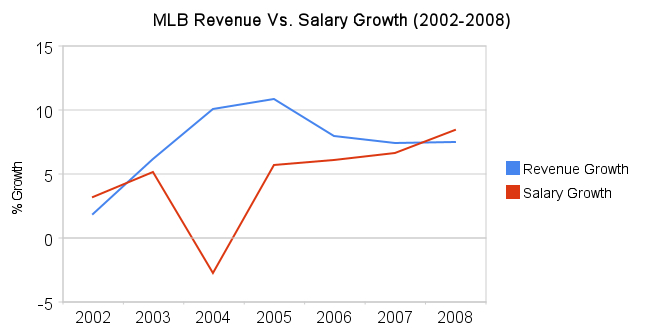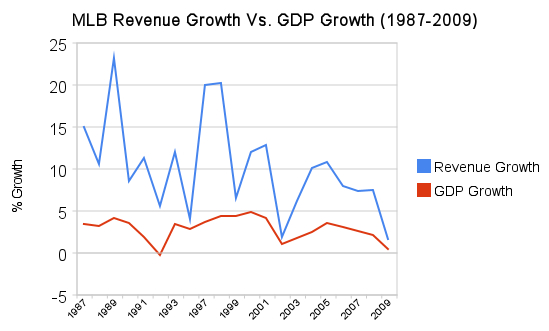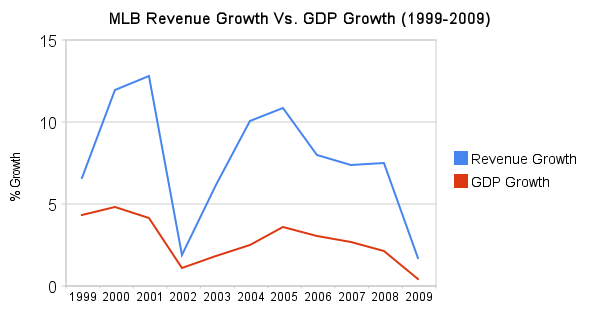BP Comment Quick Links

 | |
January 14, 2010 Squawking BaseballWaiting for the Winter of 2011-12
Let's throw some cold water on an outdated idea: player salaries don't always go up. Over the long term, there's always going to be a decent amount of inflation in payrolls, but it's very cyclical-instead of rising 10 percent every year, as we lazily tend to assume, there are significant peaks and troughs along the way. Right now, because of the recession, we're in a down cycle-2010 payrolls will likely be flat from their 2008 levels, meaning that any team that signed a mediocre player to a "going rate" contract in '07 or '08, assuming that it would look cheap by the time it was done, is probably feeling very sorry today. On the flip side, there's a pretty good chance that we'll look back at some of the deals signed during this recession and think of them as absolute steals. The question is, how well can we actually predict these cycles? And if we can, when should we expect the market to finally rebound? Let's start with the basics. We know that payrolls are more or less a function of team revenues and, over time, salary growth and revenue growth will track each other pretty well. But they don't always move perfectly in tandem, especially when there are major changes in the sport's economic landscape-like, for example, when we're in a recession. We only have full salary data going back to 1985, which leaves us with just two American recessions to work with, and one of those occurred right after MLB's collusion era, so the data is pretty wonked. But the 2001 recession is probably a good comp here-there are, after all, most of the same owners, the same commissioner, and the same general directives in place. If we assume that this downturn will follow the same pattern as the last one, revenue will likely recover first:
 (Note that I'm only discussing team revenue, so this doesn't count MLBAM, MLB Network, and other shared subsidiaries, aside from the dividends that those companies occasionally pay out.) We also know that player salaries are highly correlated to the previous year's revenue-particularly ticket sales-so this pattern seems to make a lot of sense. Add in the fact that MLB has become incredibly vigilant about warning the owners to stay within their means, and all signs point to increased revenue growth being the leading indicator here. Now we just need to know what will restart revenue growth. Once in a while, there are certain catalysts that produce huge boosts-the explosion in television rights fees in the '70s and '80s, the expanded playoffs in the '90s, and so on. But most of baseball's growth is organic, and can be predicted fairly well with the most standard mechanism there is: the U.S. GDP. Tommy did some pretty cool work on this front a while back on Beyond the Boxscore, finding that over the long-term, player salaries will generally grow twice as fast as GDP-so if the economy grows five percent over a period of years, we can expect salaries to jump about 10 percent. But since we're looking for ultra-short-term leading indicators, we need to get more specific. Specifically, how does one year's real GDP growth affect MLB revenues? Here's the chart, going back to 1987:
 (Technical note: since GDP is our leading indicator, I used GDP in year x and MLB revenues in year x+1. There is no noticeable relationship between GDP and MLB revenues in the same year. Also, 1994 and 1995 have been eliminated for obvious reasons. Punch was served.) There's a reasonably solid connection here: a .46 r-squared correlation in these years between one year's GDP growth and MLB's growth the following year. This means that almost half of the variation in MLB revenues from '87-'09 can be explained by US GDP. We can still isolate out more variables, though. We know that cable television, the growth in national rights fees, and the wild card all had very significant effects on baseball's business, beyond the normal organic growth that they can normally count on. So if we cut off the first part of that chart and start our sample in 1999, when most of these catalysts were already pretty engrained, we can get a clearer picture of GDP's impact. Check out the new chart:
 Those are almost mirror images. Over the last 10 years, a period in which almost all of baseball's growth has been organic, 87 percent of the variation in total revenue can be explained just by the previous year's GDP alone. There's also a pretty simple equation we can take from this to create a very basic-and yet incredibly accurate-rule of thumb: for every extra point of GDP, MLB revenue rises by three percent the following year. This has been very consistent over the past 10 years, and has held true through two recessions and one lengthy bull market. Given all that, it's pretty clear why the market is still so rough for mid-level players. The GDP for 2009 is expected to be down around two percent, and it's only that high because of the easy comparisons from the second half of 2008. No, baseball revenues aren't going to decline by six percent in 2010, but they could easily be flat. Last year got a huge boost from the Yankees and Mets opening new stadiums, and there are still going to be a lot of teams feeling some serious pain. But given some of the optimistic 2010 GDP projections that have been coming out recently-three to four percent seems to be the consensus right now-MLB revenues could be in line for a big boost in 2011, on par with those in 2004 and 2005. Based on the pattern we've seen-GDP rises the year before MLB revenue, MLB revenue rises the year before player salaries-the winter of 2011-12 could be the one the players finally start cashing in again. It also means that while this offseason is probably the bottom, next year could be the one that produces the best long-term deals. Players right now are extremely cautious, and don't want to get locked into below-market deals for three or four years (e.g. Adrian Beltre). But next year, the market may recover just enough to push players over that edge, right in time for a big surge in baseball inflation in the years ahead. (Derek Lowe's deal with the Dodgers is a good example of this from the last upturn.) It should go without saying, these cycles are incredibly important, and often overlooked. The teams that nail these timelines are going to come out well ahead of the curve.
Shawn Hoffman is an author of Baseball Prospectus.
|
"Last year got a huge boost from the Yankees and Mets opening new stadiums" -- do we know this to be true, or is it just assumed based on past experience with other new stadiums? We heard an awful lot last year about unsold expensive seats at both, and both have smaller capacities than the stadiums they replaced, which make it plausible that the typical revenue pop didn't occur.
We know industry revenue was basically flat or a little up, or a little down if we take out MLB Network. Since ~20 teams had attendance declines -- some huge -- it makes sense that a small amount of teams held up the rest. If you look at NYY's and NYM's pricing from '08 to '09, especially re: suites, you can see how much more revenue they likely brought in.
According to Baseball Almanac, the Mets' attendance declined by 900,000 last year, probably a lot of which is because of the smaller capacity in the stadium and that the team was out of it by August. Still, a decline of about 30% in attendance means they would have had to made up the difference in seats, concessions, suites, etc., by an increase of 30% to break even, which seems likely, but I doubt the Mets were a cash cow last year because of the stadium. It's also fair to question what happens this year, given the lack of real decrease in ticket prices and the pessimism of the Flushing Faithful.